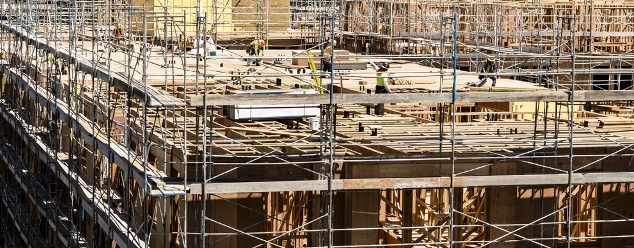Opinion
Prevailing wage crucial for construction workers
 A high-rise construction site in San Jose. (Photo: PBK-PG, via Shutterstock)
A high-rise construction site in San Jose. (Photo: PBK-PG, via Shutterstock)It is sadly ironic that portions of the construction industry have been fighting for years to reduce wages on these important but dangerous jobs are now claiming they face a skilled labor shortage.
Just last year, California’s housing industry spent millions of dollars lobbying against minimum labor standards in any part of the residential construction sector. Even though research shows that construction labor represents a paltry 15% of total housing construction costs, they tried making the mathematically absurd claim that paying their workers enough to pay the rent –even in exchange for less red tape on certain projects — would somehow make California’s housing affordability crisis worse.
Some California contractors talking about labor shortages were trying to convince California municipalities to become “charter cities” so they could circumvent prevailing wage rules.
But they haven’t been the only ones.
Since 2015, five U.S. states have repealed their prevailing wage laws — laws that establish minimum wages for different skilled crafts on publicly funded projects and promote privately financed training programs that are designed to prevent skilled labor shortages. Other states are considering following suit, even though labor represents just over 20% of the total cost of public works projects — a historically small and declining share in what constitutes fully one-third of all output in America’s fourth-largest economic sector.
America is as close to full employment as we have been in decades. We need to build a lot more housing. Nationally, we have at least $1.5 trillion in unmet infrastructure needs. And unless the people complaining about so-called “skilled labor shortages” come to their senses on wage and training standards, it will only become harder for them to find workers.
It’s important to remember how we got here. The same construction industry groups that have been fighting to eliminate prevailing wage standards were also championing the cause for more guest workers. They knew that so long as they had a steady supply of easily exploitable immigrant labor, they could still win some market share and forestall the inevitable quandary in which they find themselves today.
This led to an explosion in, among other things, wage theft. A 2015 Economic Roundtable study found that it has grown by 400% in the construction industry since the 1970’s, and one in five California construction workers are now being ripped off by their employers.
For immigrants and non-immigrants alike, this is hardly a compelling advertisement to come work in America’s construction industry.
Unfortunately, some states have decided to codify these attacks on construction workers into law. The results have not been pretty.
Earlier this month, the Midwest Economic Policy Institute and Colorado State University Economist Kevin Duncan released a study assessing the damage from Indiana—the first of the recent states to repeal prevailing wage. They found that repeal had lowered construction wages by 8%, increased the share of low-skilled workers in the construction workforce, reduced productivity, and failed to save any money on school construction costs. “It hasn’t saved us a penny,” as one state GOP lawmaker put it.
These attacks have also not been confined to other parts of the country.
Just a few years ago, some of the same California contractors talking about labor shortages today were trying to convince California municipalities to become “charter cities” so they could circumvent prevailing wage rules on locally funded projects. Fortunately, the State Legislature and Governor Brown put a stop to those shenanigans with a law that encouraged charter cities to abide these standards.
Ultimately, the best way to prevent construction labor shortages is to invest in what works—labor/management partnerships, which currently produce over 90% of our state’s construction trade apprentices. And the research tells us that prevailing wage standards dramatically boost participation in these programs by putting more workers on a path to viable middle class careers.
What groups that routinely attack prevailing wage are learning is not that no one wants to work in construction. They are learning that no one wants to work for them—so long as their business models are built on the idea of waging war against their own workers.
—
Ed’s Note: Samantha Draper is a Research Analyst for Smart Cities Prevail, a leading construction industry research non-profit. Learn more at www.smartcitiesprevail.org.
Want to see more stories like this? Sign up for The Roundup, the free daily newsletter about California politics from the editors of Capitol Weekly. Stay up to date on the news you need to know.
Sign up below, then look for a confirmation email in your inbox.

I’m agree basically but, when are going to STOP “building” houses and even huge construction projects with WOOD? Our pseudo patriotic construction industry leaders knows that our planet are being deforested, enormous rain forest had been cleaned up just to full the deep greedy of these individuals. That we don’t live in a super developed country to find out a material that could substitute wood? That we live in such a country that Spend and Waste billion of dollars in lethal arms destruction? C’mon guys!
You really have no clue
I have friends that work on Federal contracts and normal construction work too. They do quality work either way, but make excessive wages with prevailing wage Federal jobs. It dilutes the buying power of Federal, State, and local governments. Free market is a good thing and prevailing wages is not free market.